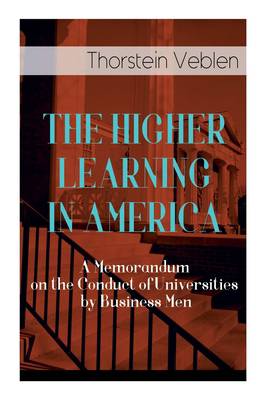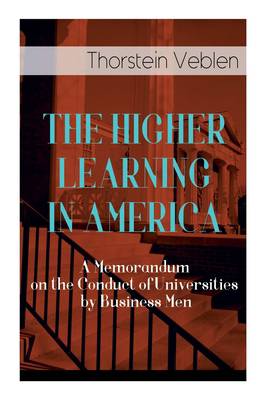
Bedankt voor het vertrouwen het afgelopen jaar! Om jou te bedanken bieden we GRATIS verzending (in België) aan op alles gedurende de hele maand januari.
- Afhalen na 1 uur in een winkel met voorraad
- In januari gratis thuislevering in België
- Ruim aanbod met 7 miljoen producten
Bedankt voor het vertrouwen het afgelopen jaar! Om jou te bedanken bieden we GRATIS verzending (in België) aan op alles gedurende de hele maand januari.
- Afhalen na 1 uur in een winkel met voorraad
- In januari gratis thuislevering in België
- Ruim aanbod met 7 miljoen producten
Zoeken
The Higher Learning in America: A Memorandum on the Conduct of Universities by Business Men
A Memorandum on the Conduct of Universities by Business Men
Thorstein Veblen
Paperback | Engels
€ 10,45
+ 20 punten
Omschrijving
In "The Higher Learning in America: A Memorandum on the Conduct of Universities by Business Men," Thorstein Veblen critically examines the interplay between higher education and capitalist influences in American society. Written in a unique blend of satirical prose and incisive social commentary, the book dissects the ways in which universities have adapted to serve the interests of corporate America, often at the expense of academic integrity and genuine scholarship. Veblen's keen observations reflect the educational climate of the early 20th century, highlighting the tension between the pursuit of knowledge and the compelling demands of commercialism, which shapes the direction of academic institutions and discourses within the academy. Thorstein Veblen, an economist and sociologist, was a pioneering figure known for his critical perspective on capitalism and its cultural impact. His formative experiences in the rapidly industrializing United States imbued him with a deep skepticism toward the business class's encroachment into educational realms. Veblen's analysis in this work draws upon his broader theories, including conspicuous consumption and social stratification, suggesting a compelling critique of the commodification of educational practices. Readers seeking to understand the complex relationship between business and academia will find Veblen's work not only enlightening but also prescient in its relevance to contemporary discussions about the role of universities. This text invites reflection on the purpose of higher education and positions itself as an essential read for those interested in the ideological underpinnings that continue to shape American universities today.
Specificaties
Betrokkenen
- Auteur(s):
- Uitgeverij:
Inhoud
- Aantal bladzijden:
- 136
- Taal:
- Engels
Eigenschappen
- Productcode (EAN):
- 9788027343997
- Verschijningsdatum:
- 3/07/2022
- Uitvoering:
- Paperback
- Formaat:
- Trade paperback (VS)
- Afmetingen:
- 152 mm x 229 mm
- Gewicht:
- 190 g

Alleen bij Standaard Boekhandel
+ 20 punten op je klantenkaart van Standaard Boekhandel
Beoordelingen
We publiceren alleen reviews die voldoen aan de voorwaarden voor reviews. Bekijk onze voorwaarden voor reviews.









